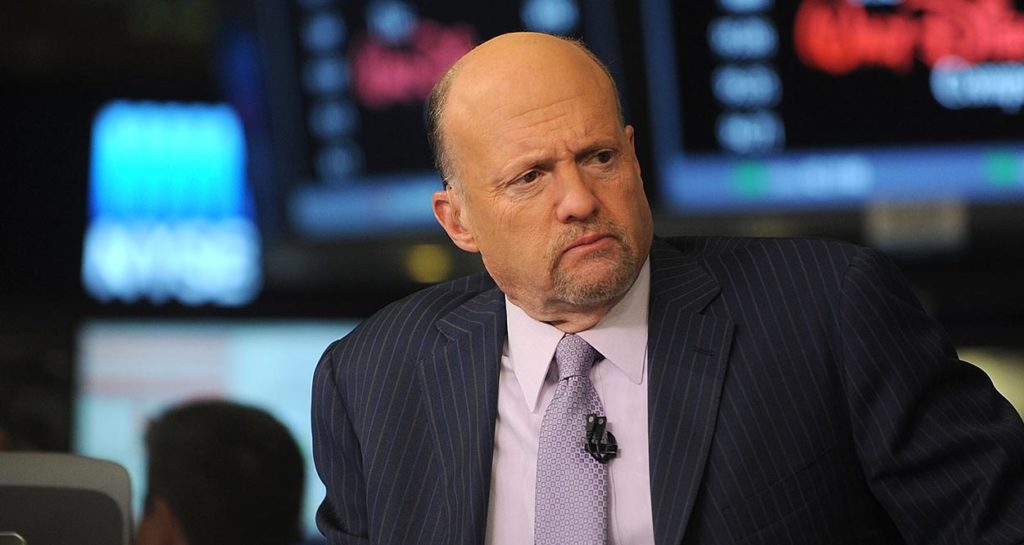
With the stock of Apple reaching a $1 trillion market cap on Thursday, CNBC’s Jim Cramer wanted to highlight the milestone’s importance for investors.
“Apple matters more than the Chinese saying that they won’t stand for President Trump’s tariff raise,” the “Mad Money” host said. “Apple matters more than whether the yield on the benchmark 10-year Treasury crosses 3 percent or not.”
To hammer his point home, Cramer found 10 reasons for why the $1 trillion level is so meaningful for the iPhone maker and the stock market.
1. The sheer magnitude
Until recently, a $1 trillion valuation would have seemed inconceivable for any company, Cramer said.
In March 2000, right around the peak of the dotcom bubble, Cisco’s market cap reached $550 billion; the internet giant then proceeded to loose nearly three-quarters of its value over the next year.
“Investors are terrified of repeating that experience,” Cramer said. “The notion that any company could ever be worth more than a half-trillion was considered dangerous, foolhardy, seditious, maybe the sign of a pending crash.”
But once the $500 billion level was successfully breached, the market’s tone changed, enabling juggernauts like Apple to surge toward $1 trillion.
And, Cramer added, Apple managed to achieve a $1 trillion market cap — the first U.S. company to do so — without being “hideously expensive,” trading at only 15 times next year’s earnings estimates.
2. The ecosystem
Investors balked when Apple got so large as a company that it started to form its own ecosystem. Its breadth made it “misunderstood,” the “Mad Money” host said.
But with Apple now charging for backing up customers’ files and retaining a slice of the profits from its App Store, its massive service revenue stream is now a growth engine, he said.
“A subscription business is perhaps the most reliable and predictable form of revenue, which is why the stock deserves a much higher price-to-earnings multiple than it has,” he said. “That’s one huge reason why Apple could trade right through this trillion-dollar mark.”
3. The consumers
Cramer also reminded investors of his thesis that Apple shouldn’t be valued like a tech company, but like a consumer products company.
“It’s a consumer products company with the best devices ever, which is why it’s got more customer loyalty than practically any other brand on earth,” he said. “Yet the stock is much, much cheaper on an earnings basis … than Clorox. If we simply valued Apple like the bleach maker, guess what?”
“I’ll whisper it,” he joked. “$300 stock.”
4. The total addressable market
“Fourth reason Apple won the footrace? While the company may seem dominant, it still has an enormous total addressable market that it hasn’t even come close to tapping,” the “Mad Money” host said.
Most companies don’t give their employees Apple’s personal computers for work, for example. But if they did, Apple’s PC business would accelerate dramatically, Cramer said.
Beyond that, Apple is only the third-largest cellphone company in the world by volume and is still trailing Samsung in terms of phone shipments: in the first quarter, Samsung shipped 78.2 million phones while Apple shipped 52 million.
“Now, the price point is a lot higher for Apple, but the iPhone is so beloved that I think they could potentially take a ton of share,” Cramer said.
5. The cash hoard
With $243 billion in the bank, Apple also has the power to buy back stock whenever it wants. The company’s CFO, Luca Maestri, has said Apple’s biggest constraints are potential federal restrictions on how much it can buy back on a given day.
“When I pressed Luca on this, he called the stock undervalued,” Cramer said. “When the guy in charge of the buyback thinks his stock is cheap, you better believe Apple will be there ‘underneath,’ as we call it, and that’s one reason why the stock tends to be a terrific buy into any dips.”
6. The management
Apple’s management team, particularly CEO Tim Cook, also helped the iPhone maker on its climb to $1 trillion, the “Mad Money” host said.
“Cook cares more about the quality of Apple’s products than he does about the quality of its stock price,” he said. “He’s taken big risks: cord configuration changes, ear buds, … sky high price points, and every time, he’s been right.”
“That said, Cook does monitor the stock,” Cramer added. “More than 100 ago — May 2, 2016 — when the bears kept saying Apple’s best days were behind it, he came on this show and pretty much called the bottom.”
7. The skeptics
With tech analysts constantly surveying suppliers and spooking investors with worries about Apple’s supply chain, the company’s stock has become a hub for voracious traders, jumping in and out on every report.
“China worries, price points, component scares; it never ends,” Cramer said. “But that wall of worry is something that great stocks climb, and few have climbed it better than Apple.”
8. The numbers
“The law of large numbers” — the idea that a large, fast-growing organization can’t keep growing at the same pace forever — has long plagued Apple.
But Apple’s record-breaking rally bucked that theory and could pave the way for other rapid growers to trounce $1 trillion, the “Mad Money” host said.
9. The inflation
Better yet for other trillion-dollar contenders, inflation has made it so that $1 trillion isn’t what it used to be. In Cramer’s words — and to the benefit of giants like Amazon — “a trillion’s not that out of hand.”
10. The others
Following his ninth point, Cramer surmised that Apple wouldn’t be alone in the trillion-dollar club for long.
“You’re going to start seeing Microsoft and Amazon in the same club because of how well they’re doing,” he said. “And among these three tech titans, I have to tell you, there’s a ton of pin action.”
Conclusions
“Here’s the bottom line: Like the iPhone X, Apple’s stock deserves to sell for what people are willing to pay for it,” the “Mad Money” host concluded. “And apparently that’s $1 trillion dollars, but, frankly, you know what? I bet it’s headed higher. Maybe a lot higher.”























